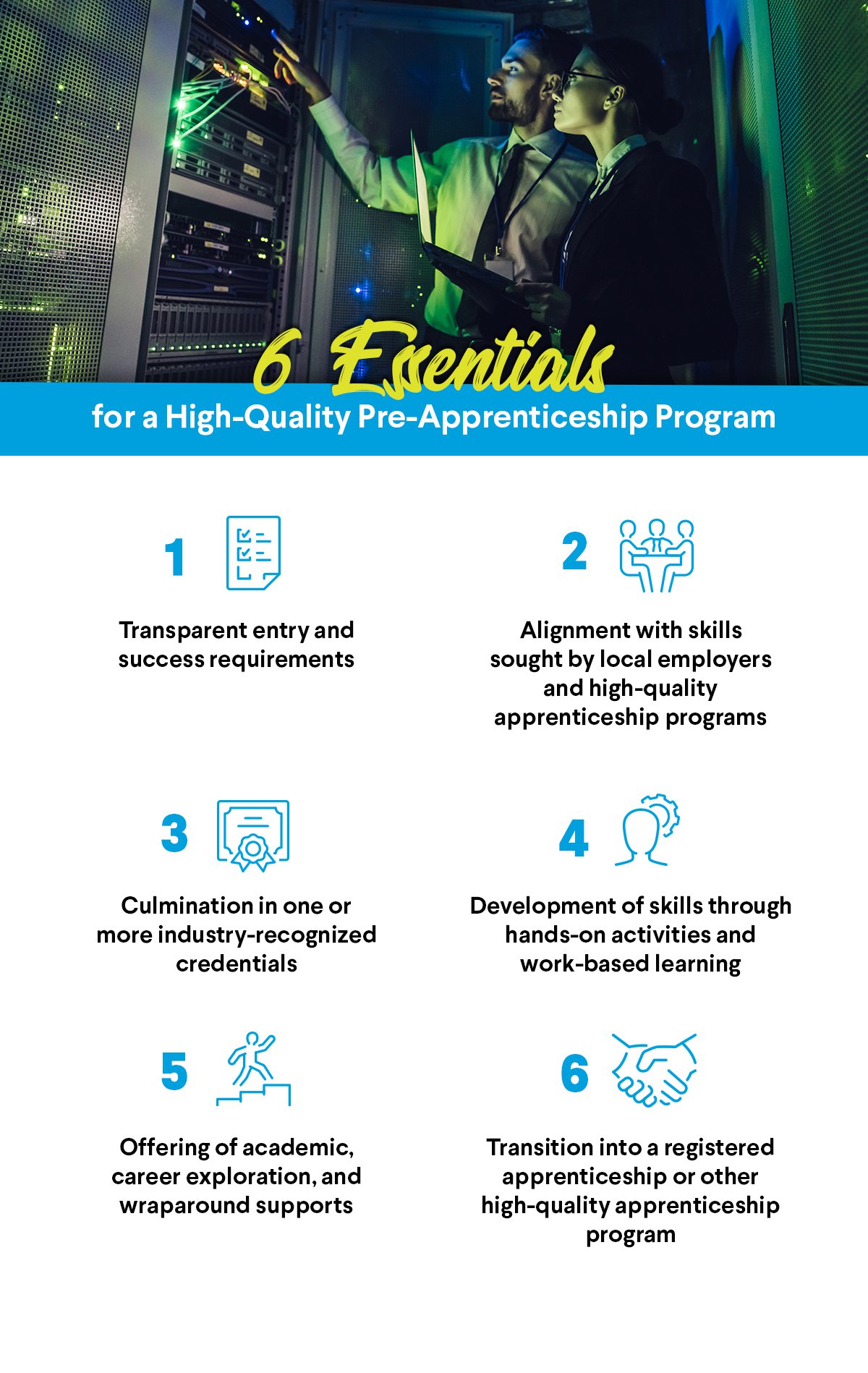
Framework for a High-Quality Pre-Apprenticeship Program: IT
July 23, 2020
At a Glance
This pre-apprenticeship framework outlines the six key characteristics of a high-quality pre-apprenticeship program with a focus on the IT industry.
This pre-apprenticeship framework outlines the six key characteristics of a high-quality pre-apprenticeship program with a focus on the IT industry. It builds on JFF’s existing Framework for A High-Quality Pre-Apprenticeship and provides specific recommendations for aligning training in the IT industry and offers examples of promising practices for existing training programs.
Pre-apprenticeship programs can be delivered by a range of entities and are designed to prepare participants for success in Registered Apprenticeships or other high-quality apprenticeship programs, and ultimately careers.
This framework can be used by new or existing programs to help guide their growth and development both in creating formal pre-apprenticeships and in strengthening their existing training practices.
COVID-19 Impacts and Considerations
The COVID-19 pandemic has dramatically changed the workforce and the ways that training across industries is designed and implemented. With the need for social distancing, training has been either put on hold or transitioned to a virtual setting, and pre-apprenticeship programs must adapt how they engage with and support their participants. Work-based learning activities and hands-on learning that are traditionally done in-person must be redesigned for remote settings, and a special emphasis needs to be placed on continued engagement and partnership with employers as they struggle to maintain their workforce.
While this has presented new challenges for providing participants with meaningful work experience and access to skill-building and social capital, it also comes with new opportunities for designing high-quality pre-apprenticeship programs in this sector. As other industries have dramatically reduced or paused their work, IT has demonstrated more resiliency in the face of COVID-19, and in these first few months has been able to keep its workforce employed and engaged. The shift to virtual learning and remote working has resulted in an increased demand for technology and for a skilled IT workforce to support this new reality.
IT is a large, dynamic, and rapidly growing sector of the U.S. economy, one in which creativity and flexibility are prized and rewarded with high wages and skills that will yield longevity in careers as the workforce becomes increasingly tech driven. However, the highly skilled nature of these jobs, combined with employer preferences for postsecondary credentials and the challenges of navigating the volume of occupations and career pathways across industries, have limited access to entry-level IT positions for many workers including those without advanced degrees or previous experience in the IT sector. To varying levels of success, programs from boot camps, to postsecondary certificate programs, to community-based training have emerged to build new on-ramps into IT.
Pre-apprenticeship programs are one such on-ramp model that can be particularly beneficial to the IT sector. Employers are in search of a skilled workforce that is able to effectively communicate, problem-solve, and adapt quickly on the job. As a result, many are increasingly turning to apprenticeship and Registered Apprenticeship as talent development solutions. Registered Apprenticeships, often considered the gold standard of apprenticeship training, are workforce training models that combine paid on-the-job learning and classroom or online instruction to help a worker master the knowledge, skills, and competencies needed for career success, while helping employers develop talented workers. They are formally approved by either the U.S. Department of Labor’s Office of Apprenticeship or a state apprenticeship agency. Pre-apprenticeship programs can provide a feeder into these highly skilled training opportunities, and attract and prepare a broader and more diverse labor force to the industry.
The purpose of this framework is to offer guidance to community-based organizations, training providers, employers, and other practitioners interested in developing a quality pre-apprenticeship program that is aligned with the specific needs of the IT industry and that advances equity in the workforce. It adapts the quality elements of JFF’s Framework for a High-Quality Pre-Apprenticeship Program and provides IT-specific recommendations. These elements include:
- transparent entry and success requirements;
- alignment of skill development with local employer and apprenticeship demand;
- provision of industry-recognized credentials;
- development of skills through work-based learning;
- inclusion of academic and career exploration, as well as wraparound supports; and
- connections and transition into a Registered Apprenticeship.
This resource also spotlights several high-performing IT training programs. While not all of these are formal pre-apprenticeship programs, the best practices highlighted demonstrate the value and impact of incorporating pre-apprenticeship elements into overall program and training design.
It is important to note that there is a critical need to advance racial and social equity in our national systems, including workforce development. While elements of this framework can help programs support underserved populations and expand access to IT careers, pre-apprenticeships should ensure that they apply a strong lens of racial and social equity to all facets of their program design and training structure. Making this approach a core component of employer partnerships and embedding it into the provision of supportive wraparound services will help pre-apprenticeships increase access to career pathways for a more diverse worker population. Practitioners should also integrate their own best practices and understanding of how to do this in meaningful and effective ways that take into consideration the unique needs of the populations and communities they are serving.

Discover the characteristics of a high-quality pre-apprenticeship program, adapted for the IT sector, with examples from the field:
Pre-apprenticeship is a proven training model for expanding access to meaningful career pathways across industries. The quality skill development offered through employer-supported WBL and hands-on training—and the provision of wraparound services and supports, including career exploration, mentorship, and opportunities to build social capital—make pre-apprenticeship particularly beneficial to an industry such as IT, where experience and connections are highly coveted by employers.
The promising practices outlined in this framework can help both existing pre-apprenticeship programs and other training models strengthen their design and improve their alignment with the pre-apprenticeship model.
These elements are essential baseline components for all pre-apprenticeship programs, regardless of the industry focus or the population served. To be truly successful in creating high-quality pre-apprenticeship training, providers should pay special attention to specific needs of the populations and communities they are serving. For example, opportunity youth and justice-involved individuals face more systemic barriers to entry in the workforce, and so the inclusion of comprehensive career-exploration and wraparound services is crucial to supporting their long-term success. Additionally, pre-apprenticeship programs need to take into consideration the local labor market information and location and density of the communities in which they operate. Having access to resources and creating partnerships to build effective postsecondary and career pathways will look different in urban communities than it will in rural ones.
Below is a list of additional reading and resources that can help pre-apprenticeships further tailor their training to meet the needs of a diverse participant population:
- Transforming IT Training Programs into Successful Career On-Ramps (JFF)
- Pre-Apprenticeship: Pathways for Women into High-Wage Careers (U.S. Department of Labor, Employment & Training Administration)
- Principles for a High-Quality Pre-Apprenticeship: A Model to Advance Equity (CLASP)
- Cultivating Rural Talent through Apprenticeship (New America)
- Skilling Up: The Scope of Modern Apprenticeship (Urban Institute)
- Apprenticeship and the Justice System: Adapting a Proven Training Model to Serve People in Prison (Urban Institute)
- Preparing Opportunity Youth for the Future of Work (JFF)
- Connecting Apprenticeships to the Young People Who Need Them Most: The Role of Community-Based Organizations (JFF)
- Opportunity Works: Four Ways to Help Young Adults Find Pathways to Success (JFF)
- Universal Design for Learning Framework (CAST)
COVID-19 Resources:
- JFF’s Equitable Recovery Hub
- “We Must Sustain Apprenticeship in a Post-Pandemic Downturn” (JFF)
- “This Crisis in Learning Requires Lasting Solutions” (JFF)
- Resource Center (National Association of Workforce Boards)
Acknowledgments
We would like to thank Salesforce for providing the grant funding to support this work and for investing in expanding equitable on-ramps to the IT industry for all workers. And we would like to express our appreciation to our external partners at IBM, JEVS, TechHire NM, and The Door/ TechBridge for providing their thoughtful feedback and recommendations on this publication.
We want to thank our colleagues Eric Seleznow and Andrea Messing-Mathie for their contributions to this framework.
Finally, we would like to thank and acknowledge the many IT training programs that participated in our scan of the industry. Their thoughtful feedback and insights into the needs of the IT training industry were crucial to designing this framework, and we appreciate their willingness to share their best practices with us. A full list of these programs can be found in the PDF.
Related Content

Pre-Apprenticeship
Pre-apprenticeship programs prepare individuals to enter and succeed in a Registered Apprenticeship or other high-quality apprenticeship program, and ultimately a career. They can be delivered by a range of entities, including community-based organizations, high schools,…

JFF's Framework for a High-Quality Pre-Apprenticeship Program
These 6 aspirational characteristics of high-quality pre-apprenticeship programs can build equity and improve success in new or existing programs. Pre-apprenticeship programs can be delivered by a range of entities and are designed to prepare underprepared…

Debugged: Diversifying IT Through Effective Training Programs
In this webinar, JFF explored how IT training programs can become more effective, equitable, and aligned with industry needs. In this webinar, JFF explored how IT training programs can become more effective, equitable, and aligned…

Transforming IT Training Programs into Successful Career On-Ramps
The IT industry is dynamic and quickly evolving. As a surge of diverse training models across subsectors and occupations is becoming available, this is a unique opportunity to enhance training practices and better align them…
